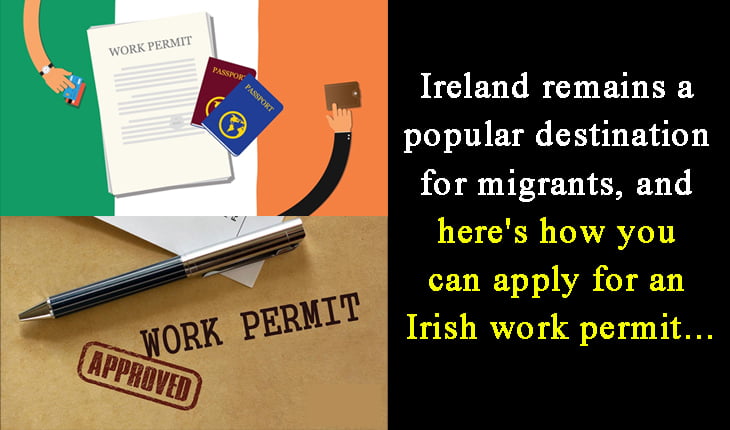Ireland remains a popular destination for migrants, and here’s how you can apply for an Irish work permit…
Over the past few years Ireland has become a popular destination for migrants seeking good employment opportunities, a high standard of living, and a peaceful lifestyle. In addition to the above mentioned factors, easy access to Europe is another element that leads migrants to consider Ireland as the best choice. It is estimated that approximately 90,000 migrants move to Ireland each year from various countries, including the UK, India, Poland, Lithuania, Romania and Latvia.
A Diverse Neighbourhoods research carried out by the Irish Economic and Social Research Institute (ESRI) found that the majority of people who come to Ireland prefer to live in affluent areas with above-average educational profiles.
Knowledge of the immigration and work permit system is essential for anyone who wish to relocate to Ireland for work. If you are a non-EEA (European Economic Area) citizen, you will most likely need a work permit before travelling to Ireland. In most cases, migrant workers with high skill levels or who can fill a vacancy in a shortage occupation are granted work permits in Ireland. Applying for an employment permit in Ireland is a relatively simple, quick, and inexpensive process.
There are nine types of employment permit in Ireland for different immigration scenarios.
● General Employment Permit
● Critical Skills Employment Permit
● Dependant/Partner/Spouse Employment Permit
● Reactivation Employment Permit
● Contract for Services Employment Permit
● Intra-Company Transfer Employment Permit
● Internship Employment Permit
● Sport and Cultural Employment Permit
● Exchange Agreement Employment Permit
The main two of these nine employment permit are the General Employment Permit and Critical Skills Employment Permit. General Employment Permit are offered for persons with a salary of €30,000 or more. This scheme will apply to all eligible occupations. The employer must carry out a labour market test to see whether the job is offered to an international candidate before offering it to an Irish national or settled worker.
If the employer has completed the labour market test, has been offered an eligible role, and the role meets all of the necessary requirements, including relevant qualifications and skills or experience, he or she can apply for a work permit.
The Critical Skills Employment Permit is only available to persons who work in occupations on the Critical Skills Occupation List. Applicants with critical skills must also have a salary of €64,000, or €32,000 if in an occupation on the Highly Skilled Occupation List, in order to qualify. Employers are not required to undergo a labor market test for this work permit due to the high demand for skills in this category.
Those who are unsure about which permit to apply for can get guidance from the Irish Department of Enterprise, Trade, and Employment or an immigration Solicitor.
How to apply for a Work Permit in Ireland?
The employer must gather all the necessary information before filling out the application. The Department of Enterprise, Trade, and Employment provides a checklist for the General Employment Permit and the Critical Skills Employment Permit that specifies all of the information that employer will need to gather.
Applicants must send their work permit application 12 weeks prior to the start date of their job. The application form must be filled online on the dedicated Employment Permits Online website of the Department of Enterprise, Trade, and Employment. The applicant must pay a €1,000 application fee (for both permits). You will be asked to attach any supporting documents, such as a copy of your passport and an offer of employment.
The latest Employment permit processing dates are available on the website of the Department of Enterprise, Trade, and Employment.
Your application will be assessed by a case officer from the Department of Enterprise, Trade, and Employment. If more information is needed during the processing, the case officer will ask you, and once all information has been gathered, the Department will make a final decision and notify you of the outcome.
You will have the best chance of obtaining a positive outcome on your employment visa application if you apply early and provide all of the needed information.
What if application is rejected?
If your application is rejected (negative decision), you may request a review of your case by filing a Submission of Decision for Review Form within 28 days of receiving your decision. If your application is denied, it is better to seek advice from an immigration lawyer as soon as possible. They will assist you in resolving the situation and, if you prefer, will manage the process on your behalf to offer you the best chance of obtaining a positive decision.
Kindly click the link below to join WhatsApp group chat to get important news and breaking news from Irish Samachar


Comments are closed.